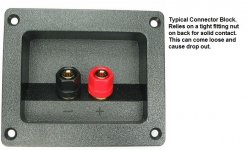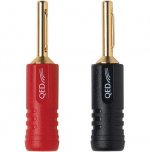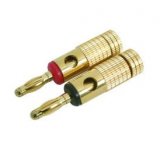I think you're dead right. Hardwiring is always better! 🙂Why cables may be directional doesn't interest me - what does is whether they effectively form a path of good conductivity throughout their length, between the electrical parts they link. And often they don't, which is why a major tweak I virtually always carry out is to hardwire the complete system - having become very sensitive to the distortion artifacts introduced by poor metal to metal contacts I have a hard time listening to systems where this is an audible factor. I would be very confident that many of these directionality possibilities simply disappear by doing this mod ...
I tuned up a KEF/Quad system for a friend once. He said it sounded amazingly better. All I did was cut the speaker cables back to fresh copper and plugged/unplugged the RCA phonos a few times back to fresh metal. Oxide is a terrible enemy of good connections.
It's also interesting to loosely short a speaker with some speaker cable across the back terminals, but not tightened up much. When you push the bass in, you hear a crackly noise at a much higher frequency from the tweeter, maybe 3kHz, due to the poor connection. In other words, noise due to poor contacts.
I don't think much of lead-free solder either, but I suppose lead poisoning to the brain is worse. Plenty of evidence of it in this thread! Ha Ha. 😀
marce, if it was that simple it all would have been sorted out, a long time ago. The headache is that a lot of focused effort is needed to get the sound good enough for these factors to become really significant - it's just not going to happen if people just plug a random collection of gear together; normal, casual testing for such things will almost never show up anything.Provide some proof, science based.....
Why people like me and Dan keep rabbiting on about it, is that we've done subjective experiments over and over again which always confirm that these factors are at play - there is nothing to "prove", for us.
Having to worry about this messiness in sorting out good audio is not something I enjoy - it's one, big, fat, pain 😱 😱 ... I would be mighty glad to be able to snap my fingers, and make all these complications magically go away ... I've been sorta hoping someone else would sort out the mess - but it ain't happening yet ... 😡 😡.
Depending upon how bad it is, it typically kills the quality of complex treble harmonics - when a cymbal is struck with authority, instead of a realistic, vibrant shimmer fading into silence you get something vaguely resembling the rubbing of kitchen utensils together ...How does a poor metal to metal contact manifest itself in your world.....
What you'll hear, more likely, is the sound of the dies emerging at high velocity from the packaging of the output transistors.........It's also interesting to loosely short a speaker with some speaker cable across the back terminals, but not tightened up much.......
Yup. Can't even feign surprise........You mean that careful simulation shows that a single cell model gives identical results to a 201 cell model in the audio band? How can this be? It was only a theory, and everyone knows that theory is just the ignorant speculation of boring engineers with poor hearing. How could theory happen to be true?
luckythedog, you are determined to mishear what I say. I am talking about a speaker that is not connected to ANYTHING! You simply push the bass in and you hear noise from the tweeter when the back terminals are loosely shorted.
The whole question of the effect of oxide corrosion on contacts might be slightly complicated by the semiconductor nature of metal oxides and hydroxides.
I really don't know what the least objectionable oxide might be. Aluminium, Tin, Copper, Silver, Gold? Lynn Olson bases his capacitor evaluations on oxides tarnishing the surface of the metal plates. I can't remember what he thought worked best. Hard wire it and it must go away in some sense. 🙂
The whole question of the effect of oxide corrosion on contacts might be slightly complicated by the semiconductor nature of metal oxides and hydroxides.
I really don't know what the least objectionable oxide might be. Aluminium, Tin, Copper, Silver, Gold? Lynn Olson bases his capacitor evaluations on oxides tarnishing the surface of the metal plates. I can't remember what he thought worked best. Hard wire it and it must go away in some sense. 🙂
Yes! I'm not interested in "fighting" this issue in systems, I spent weeks, months about 3 decades ago going around in circles with this sort of stuff, and the firm conclusion was: hardwire!! ... good, end of problems! ... okay, what's the next SQ issue ... ?I really don't know what the least objectionable oxide might be. Aluminium, Tin, Copper, Silver, Gold? Lynn Olson bases his capacitor evaluations on oxides tarnishing the surface of the metal plates. I can't remember what he thought worked best. Hard wire it and it must go away in some sense. 🙂
marce, if it was that simple it all would have been sorted out, a long time ago. The headache is that a lot of focused effort is needed to get the sound good enough for these factors to become really significant - it's just not going to happen if people just plug a random collection of gear together; normal, casual testing for such things will almost never show up anything.
Why people like me and Dan keep rabbiting on about it, is that we've done subjective experiments over and over again which always confirm that these factors are at play - there is nothing to "prove", for us.
Having to worry about this messiness in sorting out good audio is not something I enjoy - it's one, big, fat, pain 😱 😱 ... I would be mighty glad to be able to snap my fingers, and make all these complications magically go away ... I've been sorta hoping someone else would sort out the mess - but it ain't happening yet ... 😡 😡.
I work in the real world and we don't see these issues or problems... you are looking at the Emperors clothes and seeing them Frank....
As to connectors, space ship-s, planes, boats, MRI scanners etc. all seem to work with connectors...
Sorry its just fantasy land ramblings unless you can provide some solid data and citations on these issues especially cable direction, it is perception playing with you... something you wont accept as flawed and easily fooled is your perceptions, don't forget you were the one that said eyes were the best calibration tool for monitors!!! perception's are fooled all the time and if you don't realise this you are fooling yourself....
So hard evidence not a couple of people perceive this is the problem.....
I think you're dead right. Hardwiring is always better! 🙂
I don't think much of lead-free solder either, but I suppose lead poisoning to the brain is worse. Plenty of evidence of it in this thread! Ha Ha. 😀
Hardwiring is not always the best way....
Lead free produces excellent joints, like all processes it has to be done correctly...
Lead from solder is not a cause of environmental lead issues, its very hard to remove... Lead in petrol was the killer.....
luckythedog, you are determined to mishear what I say. I am talking about a speaker that is not connected to ANYTHING! You simply push the bass in and you hear noise from the tweeter when the back terminals are loosely shorted.
The whole question of the effect of oxide corrosion on contacts might be slightly complicated by the semiconductor nature of metal oxides and hydroxides.
I really don't know what the least objectionable oxide might be. Aluminium, Tin, Copper, Silver, Gold? Lynn Olson bases his capacitor evaluations on oxides tarnishing the surface of the metal plates. I can't remember what he thought worked best. Hard wire it and it must go away in some sense. 🙂
Plenty of objective data out there, don't have to make things up.....semiconductor issues!!!!!!!
Semiconductors (and we include metal oxides here) are simply non-linear. Not controversial. I really start to wonder just how much some of you guys actually know? 🙄
Here's a component that really don't work too well. Back terminals on speakers rely on washers and nuts tightened up as much as you can. I've had problems with these. Better to hard solder.
Banana plugs come in two varieties. I prefer this QED type rather than the loosely sleeved ones.
Here's a component that really don't work too well. Back terminals on speakers rely on washers and nuts tightened up as much as you can. I've had problems with these. Better to hard solder.
Banana plugs come in two varieties. I prefer this QED type rather than the loosely sleeved ones.
Attachments
A lot more than you when it comes to connecting up electronics systems...
We are not talking about semi-conductors as such but oxides on connectors...increased resistance the main problem in real world electronics...in audio who knows what problems you can imagine.....
We are not talking about semi-conductors as such but oxides on connectors...increased resistance the main problem in real world electronics...in audio who knows what problems you can imagine.....
And so do audio systems, they have happily done so for many, many decades of design, construction and use. What we're talking about is not whether they work, but whether there are flaws which intrude into the correct operation of the devices. And correct operation, for me, is that convincing sound is realised - if one system can do convincing sound, and another can't - well, my take is that one is "superior" to the other ...I work in the real world and we don't see these issues or problems... you are looking at the Emperors clothes and seeing them Frank....
As to connectors, space ship-s, planes, boats, MRI scanners etc. all seem to work with connectors...
Drop the cable direction thing, please, that's not my bag!! As regards perception, go back and note my remarks about winetasting ... what I listen for are flaws and faults in the working of the system, something which is quite straightforward to do - if I don't hear any, then it is an acceptable system - there is no need for any foolin' to take place.Sorry its just fantasy land ramblings unless you can provide some solid data and citations on these issues especially cable direction, it is perception playing with you... something you wont accept as flawed and easily fooled is your perceptions, don't forget you were the one that said eyes were the best calibration tool for monitors!!! perception's are fooled all the time and if you don't realise this you are fooling yourself....
So hard evidence not a couple of people perceive this is the problem.....
Why the TV calibration has worked, is because I'm always happy with what I get - I have zero itch to fiddle with it any more, any time a natural, landscape setting appears on the screen it always feel right - I'm content with the settings ... somehow, I think this is a somewhat important consideration ...
A lot more than you when it comes to connecting up electronics systems...
We are not talking about semi-conductors as such but oxides on connectors...increased resistance the main problem in real world electronics...in audio who knows what problems you can imagine.....
Well, you can certainly learn something from me. With analog connectors, corrosion and dirt and grease is VERY BAD for the sound! Digital might be more forgiving, up to the point when it just plain falls over. 😎
Very dumb and hostile thread this, IMO. I don't know why I bother sometimes. Hardly a meeting of minds working toward a common solution. 😱
Well, you can certainly learn something from me. With analog connectors, corrosion and dirt and grease is VERY BAD for the sound!
Yes, those of us who didn't breathe the rarified air of whatever college you were bragging about were totally unaware that dirty connectors needed to be cleaned or replaced before using. Or that they needed to be tightened down. We, the benighted masses, are eternally grateful for your enlightening comments.
Yes, those of us who didn't breathe the rarified air of whatever college you were bragging about were totally unaware that dirty connectors needed to be cleaned or replaced before using. Or that they needed to be tightened down. We, the benighted masses, are eternally grateful for your enlightening comments.
Bit of a chip on your shoulder there, SY. You've really been trashing this thread right from the start! Not really fitting for a moderator.
You could lose the pitbull avatar too. Supposed to make you look tough? Certainly makes you look ugly.
Why the TV calibration has worked, is because I'm always happy with what I get - I have zero itch to fiddle with it any more, any time a natural, landscape setting appears on the screen it always feel right - I'm content with the settings ... somehow, I think this is a somewhat important consideration ...
Accuracy is important, this highlights the difference, I want accuracy so will not rely on my easily deceived perceptions, but will back them up with measurements and the odd bit of science....
Cable directivity lives in the same wardrobe as the rest of the Emperors' clothes, sorry cant separate it.......
Well, you can certainly learn something from me. With analog connectors, corrosion and dirt and grease is VERY BAD for the sound! Digital might be more forgiving, up to the point when it just plain falls over. 😎
Very dumb and hostile thread this, IMO. I don't know why I bother sometimes. Hardly a meeting of minds working toward a common solution. 😱
No I cant... sorry
I do analogue and digital...
Lets look at this another way, the domestic environment is very benign, if you cant hook up a bit of audio then I would give up now..... of course you could always clean your connectors occasionally...
If you are going to teach tell us how all this grease dirt etc .(in a pollution degree 2 environment, a benign level 2 at that....) affect the signal and how do you let your connectors get that bad.
Bit of a chip on your shoulder there, SY. You've really been trashing this thread right from the start! Not really fitting for a moderator.
You could lose the pitbull avatar too. Supposed to make you look tough? Certainly makes you look ugly.
Watch it 7, He might eat you for lunch LOL..
I'm sure most on here can see that SY sounds belligerent and has the "Archie Bunker" point of view on all facets of Audio.
- Status
- Not open for further replies.
- Home
- Member Areas
- The Lounge
- Speaker Cable lifters or stands?


